- Home
- Robert Ervin Howard
The People of the Black Circle (conan the barbarian) Page 2
The People of the Black Circle (conan the barbarian) Read online
Page 2
Chunder Shan, entering his chamber, closed the door and went to his table. There he took the letter he had been writing and tore it to bits. Scarcely had he finished when he heard something drop softly onto the parapet adjacent to the window. He looked up to see a figure loom briefly against the stars, and then a man dropped lightly into the room. The light glinted on a long sheen of steel in his hand.
"Shhhh!" he warned. "Don't make a noise, or I'll send the devil a henchman!"
The governor checked his motion toward the sword on the table. He was within reach of the yard-long Zhaibar knife that glittered in the intruder's fist, and he knew the desperate quickness of a hillman.
The invader was a tall man, at once strong and supple. He was dressed like a hillman, but his dark features and blazing blue eyes did not match his garb. Chunder Shan had never seen a man like him; he was not an Easterner, but some barbarian from the West. But his aspect was as untamed and formidable as any of the hairy tribesmen who haunt the hills of Ghulistan.
"You come like a thief in the night," commented the governor, recovering some of his composure, although he remembered that there was no guard within call. Still, the hillman could not know that.
"I climbed a bastion ," snarled the intruder. "A guard thrust his head over the battlement in time for me to rap it with my knifehilt."
"You are Conan?"
"Who else? You sent word into the hills that you wished for me to come and parley with you. Well, by Crom, I've come! Keep away from that table or I'll gut you."
"I merely wish to seat myself," answered the governor, carefully sinking into the ivory chair, which he wheeled away from the table. Conan moved restlessly before him, glancing suspiciously at the door, thumbing the razor edge of his three-foot knife. He did not walk like an Afghuli, and was bluntly direct where the East is subtle.
"You have seven of my men," he said abruptly. "You refused the ransom I offered. What the devil do you want?"
"Let us discuss terms," answered Chunder Shan cautiously.
"Terms?" There was a timbre of dangerous anger in his voice. "What do you mean? Haven't I offered you gold?"
Chunder Shan laughed.
"Gold? There is more gold in Peshkhauri than you ever saw."
"You're a liar," retorted Conan. "I've seen the suk of the goldsmiths in Khurusun."
"Well, more than an Afghuli ever saw," amended Chunder Shan. "And it is but a drop of all the treasure of Vendhya. Why should we desire gold? It would be more to our advantage to hang these seven thieves."
Conan ripped out a sulfurous oath and the long blade quivered in his grip as the muscles rose in ridges on his brown arm.
"I'll split your head like a ripe melon!"
A wild blue flame flickered in the hillman's eyes, but Chunder Shan shrugged his shoulders, though keeping an eye on the keen steel.
"You can kill me easily, and probably escape over the wall afterward. But that would not save the seven tribesmen. My men would surely hang them. And these men are headmen among the Afghulis."
"I know it," snarled Conan. "The tribe is baying like wolves at my heels because I have not procured their release. Tell me in plain words what you want, because, by Crom! if there's no other way, I'll raise a horde and lead it to the very gates of Peshkhauri!"
Looking at the man as he stood squarely, knife in fist and eyes glaring, Chunder Shan did not doubt that he was capable of it. The governor did not believe any hill-horde could take Peshkhauri, but he did not wish a devastated countryside.
"There is a mission you must perform," he said, choosing his words with as much care as if they had been razors. "There—"
Conan had sprung back, wheeling to face the door at the same instant, lips asnarl. His barbarian ears had caught the quick tread of soft slippers outside the door. The next instant the door was thrown open and a slim, silk-robed form entered hastily, pulling the door shut—then stopping short at sight of the hillman.
Chunder Shan sprang up, his heart jumping into his mouth.
"Devi!" he cried involuntarily, losing his head momentarily in his fright.
"Devi" It was like an explosive echo from the hillman's lips. Chunder Shan saw recognition and intent flame up in the fierce blue eyes.
The governor shouted desperately and caught at his sword, but the hillman moved with the devastating speed of a hurricane. He sprang, knocked the governor sprawling with a savage blow of his knife-hilt, swept up the astounded Devi in one brawny arm and leaped for the window. Chunder Shan, struggling frantically to his feet, saw the man poise an instant on the sill in a flutter of silken skirts and white limbs that was his royal captive, and heard his fierce, exultant snarl: "Now dare to hang my men!" and then Conan leaped to the parapet and was gone. A wild scream floated back to the governor's ears.
"Guard! Guard!" screamed the governor, struggling up and running drunkenly to the door. He tore it open and reeled into the hall. His shouts re-echoed along the corridors, and warriors came running, gaping to see the governor holding his broken head, from which the blood streamed.
"Turn out the lancers!" he roared. "There has been an abduction!"
Even in his frenzy he had enough sense left to withhold the full truth. He stopped short as he heard a sudden drum of hoofs outside, a frantic scream and a wild yell of barbaric exultation.
Followed by the bewildered guardsmen, the governor raced for the stair. In the courtyard of the fort a force of lancers stood by saddled steeds, ready to ride at an instant's notice. Chunder Shan led his squadron flying after the fugitive , though his head swam so he had to hold with both hands to the saddle. He did not divulge the identity of the victim, but said merely that the noblewoman who had borne the royal signet-ring had been carried away by the chief of the Afghulis. The abductor was out of sight and hearing, but they knew the path he would strike the road that runs straight to the mouth of the Zhaibar. There was no moon; peasant huts rose dimly in the starlight. Behind them fell away the grim bastion of the fort, and the towers of Peshkhauri. Ahead of them loomed the black walls of the Himelians.
Chapter III: Khemsa Uses Magic
In the confusion that reigned in the fortress while the guard was being turned out, no one noticed that the girl who had accompanied the Devi slipped out the great arched gate and vanished in the darkness. She ran straight for the city, her garments tucked high. She did not follow the open road, but cut straight through fields and over slopes, avoiding fences and leaping irrigation ditches as surely as if it were broad daylight, and as easily as if she were a trained masculine runner. The hoof-drum of the guardsmen had faded away up the hill before she reached the city wall. She did not go to the great gate, beneath whose arch men leaned on spears and craned their necks into the darkness, discussing the unwonted activity about the fortress. She skirted the wall until she reached a certain point where the spire of the tower was visible above the battlements. Then she placed her hands to her mouth and voiced a low weird call that carried strangely.
Almost instantly a head appeared at an embrasure and a rope came wriggling down the wall. She seized it, placed a foot in the loop at the end, and waved her arm. Then quickly and smoothly she was drawn up the sheer stone curtain. An instant later she scrambled over the merlons and stood up on a flat roof which covered a house that was built against the wall. There was an open trap there, and a man in a camel-hair robe who silently coiled the rope, not showing in any way the strain of hauling a full-grown woman up a forty-foot wall.
"Where is Kerim Shah?" she gasped, panting after her long run.
"Asleep in the house below. You have news?"
"Conan has stolen the Devi out of the fortress and carried her away into the hills!" She blurted out her news in a rush, the words stumbling over one another.
Khemsa showed no emotion, but merely nodded his turbaned head. "Kerim Shah will be glad to hear that," he said.
"Wait!" The girl threw her supple arms about his neck. She was panting hard, but not only from exertion. Her eyes b
lazed like black jewels in the starlight. Her upturned face was close to Khemsa's, but though he submitted to her embrace, he did not return it.
"Do not tell the Hyrkanian!" she panted. "Let us use this knowledge ourselves! The governor has gone into the hills with his riders, but he might as well chase a ghost. He has not told anyone that it was the Devi who was kidnapped. None in Peshkhauri or the fort knows it except us."
"But what good does it do us?" the man expostulated. "My masters sent me with Kerim Shah to aid him in every way-"
"Aid yourself?" she cried fiercely. "Shake off your yoke!"
"You mean—disobey my masters?" he gasped, and she felt his whole body turn cold under her arms.
"Aye!" she shook him in the fury of her emotion. "You too are a magician! Why will you be a slave, using your powers only to elevate others? Use your arts for yourself?"
"That is forbidden!" He was shaking as if with an ague. "I am not one of the Black Circle . Only by the command of the masters do I dare to use the knowledge they have taught me."
"But you can use it!" she argued passionately. "Do as I beg you! Of course Conan has taken the Devi to hold as hostage against the seven tribesmen in the governor's prison. Destroy them, so Chunder Shan can not use them to buy back the Devi. Then let us go into the mountains and take her from the Afghulis. They can not stand against your sorcery with their knives. The treasure of the Vendhyan kings will be ours as ransom—and then when we have it in our hands, we can trick them, and sell her to the king of Turan. We shall have wealth beyond our maddest dreams. With it we can buy warriors. We will take Khorbhul , oust the Turanians from the hills, and send our hosts southward; become king and queen of an empire!"
Khemsa too was panting, shaking like a leaf in her grasp; his face showed gray in the starlight, beaded with great drops of perspiration.
"I love you!" she cried fiercely, writhing her body against his, almost strangling him in her wild embrace, shaking him in her abandon. "I will make a king of you! For love of you I betrayed my mistress; for love of me betray your masters! Why fear the Black Seers? By your love for me you have broken one of their laws already! Break the rest! You are as strong as they!"
A man of ice could not have withstood the searing heat of her passion and fury. With an inarticulate cry he crushed her to him, bending her backward and showering gasping kisses on her eyes, face and lips.
"I'll do it!" His voice was thick with laboring emotions. He staggered like a drunken man. "The arts they have taught me shall work for me, not for my masters. We shall be rulers of the world—of the world—"
"Come then!" Twisting lithely out of his embrace, she seized his hand and led him toward the trap-door. "First we must make sure that the governor does not exchange those seven Afghulis for the Devi."
He moved like a man in a daze, until they had descended a ladder and she paused in the chamber below. Kerim Shah lay on a couch motionless, an arm across his face as though to shield his sleeping eyes from the soft light of a brass lamp. She plucked Khemsa's arm and made a quick gesture across her own throat. Khemsa lifted his hand; then his expression changed and he drew away.
"I have eaten his salt," he muttered. "Besides, he can not interfere with us."
He led the girl through a door that opened on a winding stair. After their soft tread had faded into silence, the man on the couch sat up. Kerim Shah wiped the sweat from his face. A knife-thrust he did not dread, but he feared Khemsa as a man fears a poisonous reptile.
"People who plot on roofs should remember to lower their voices," he muttered. "But as Khemsa has turned against his masters, and as he was my only contact between them, I can count on their aid no longer. From now on I play the game in my own way."
Rising to his feet he went quickly to a table, drew pen and parchment from his girdle and scribbled a few succinct lines.
"To Khosru Khan, governor of Secunderam: the Cimmerian Conan has carried the Devi Yasmina to the villages of the Afghulis. It is an opportunity to get the Devi into our hands, as the lung has so long desired. Send three thousand horsemen at once. I will meet them in the valley of Gurashah with native guides."
And he signed it with a name that was not in the least like Kerim Shah.
Then from a golden cage he drew forth a carrier pigeon, to whose leg he made fast the parchment, rolled into a tiny cylinder and secured with gold wire. Then he went quickly to a casement and tossed the bird into the night. It wavered on fluttering wings, balanced, and was gone like a flitting shadow. Catching up helmet, sword and cloak, Kerim Shah hurried out of the chamber and down the winding stair.
The prison quarters of Peshkhauri were separated from the rest of the city by a massive wall, in which was set a single ironbound door under an arch. Over the arch burned a lurid red cresset , and beside the door squatted a warrior with spear and shield.
This warrior, leaning on his spear, and yawning from time to time, started suddenly to his feet. He had not thought he had dozed, but a man was standing before him, a man he had not heard approach. The man wore a camel-hair robe and a green turban. In the flickering light of the cresset his features were shadowy, but a pair of lambent eyes shone surprizingly in the lurid glow.
"Who comes?" demanded the warrior, presenting his spear. "Who are you?"
The stranger did not seem perturbed, though the spear-point touched his bosom. His eyes held the warrior's with strange intensity.
"What are you obliged to do?" he asked, strangely.
"To guard the gate!" The warrior spoke thickly and mechanically; he stood rigid as a statue, his eyes slowly glazing.
"You lie! You are obliged to obey me! You have looked into my eyes, and your soul is no longer your own. Open that door!"
Stiffly, with the wooden features of an image, the guard wheeled about, drew a great key from his girdle, turned it in the massive lock and swung open the door. Then he stood at attention, his unseeing stare straight ahead of him.
A woman glided from the shadows and laid an eager hand on the mesmerist's arm.
"Bid him fetch us horses, Khemsa," she whispered.
"No need of that," answered the Rakhsha. Lifting his voice slightly he spoke to the guardsman. "I have no more use for you. Kill yourself!"
Like a man in a trance the warrior thrust the butt of his spear against the base of the wall, and placed the keen head against his body, just below the ribs. Then slowly, stolidly, he leaned against it with all his weight, so that it transfixed his body and came out between his shoulders. Sliding down the shaft he lay still, the spear jutting above him its full length, like a horrible stalk growing out of his back.
The girl stared down at him in morbid fascination, until Khemsa took her arm and led her through the gate. Torches lighted a narrow space between the outer wall and a lower inner one, in which were arched doors at regular intervals. A warrior paced this enclosure, and when the gate opened he came sauntering up, so secure in his knowledge of the prison's strength that he was not suspicious until Khemsa and the girl emerged from the archway. Then it was too late. The Rakhsha did not waste time in hypnotism, though his action savored of magic to the girl. The guard lowered his spear threateningly, opening his mouth to shout an alarm that would bring spearmen swarming out of the guardrooms at either end of the alleyway. Khemsa flicked the spear aside with his left hand, as a man might flick a straw, and his right flashed out and back, seeming gently to caress the warrior's neck in passing. And the guard pitched on his face without a sound, his head lolling on a broken neck.
Khemsa did not glance at him, but went straight to one of the arched doors and placed his open hand against the heavy bronze lock. With a rending shudder the portal buckled inward. As the girl followed him through, she saw that the thick teakwood hung in splinters, the bronze bolts were bent and twisted from their sockets, and the great hinges broken and disjointed. A thousand-pound battering-ram with forty men to swing it could have shattered the barrier no more completely. Khemsa was drunk with freedom and the exercise
of his power, glorying in his might and flinging his strength about as a young giant exercises his thews with unnecessary vigor in the exultant pride of his prowess.
The broken door let them into a small courtyard, lit by a cresset. Opposite the door was a wide grille of iron bars. A hairy hand was visible, gripping one of these bars, and in the darkness behind them glimmered the whites of eyes.
Khemsa stood silent for a space, gazing into the shadows from which those glimmering eyes gave back his stare with burning intensity. Then his hand went into his robe and came out again, and from his opening fingers a shimmering feather of sparkling dust sifted to the flags. Instantly a flare of green fire lighted the enclosure. In the brief glare the forms of seven men, standing motionless behind the bars, were limned in vivid detail; tall, hairy men in ragged hillmen's garments. They did not speak, but in their eyes blazed the fear of death, and their hairy fingers gripped the bars.
The fire died out but the glow remained, a quivering ball of lambent green that pulsed and shimmered on the flags before Khemsa's feet. The wide gaze of the tribesmen was fixed upon it. It wavered, elongated; it turned into a luminous green-smoke spiraling upward. It twisted and writhed like a great shadowy serpent, then broadened and billowed out in shining folds and whirls. It grew to a cloud moving silently over the flags—straight toward the grille. The men watched its coming with dilated eyes; the bars quivered with the grip of their desperate fingers. Bearded lips parted but no sound came forth. The green cloud rolled on the bars and blotted them from sight; like a fog it oozed through the grille and hid the men within. From the enveloping folds came a strangled gasp, as of a man plunged suddenly under the surface of water. That was all.

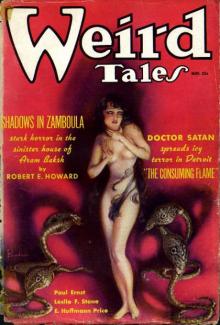 Shadows in Zamboula (conan the barbarian)
Shadows in Zamboula (conan the barbarian) Shadows in the Moonlight (conan the barbarian)
Shadows in the Moonlight (conan the barbarian)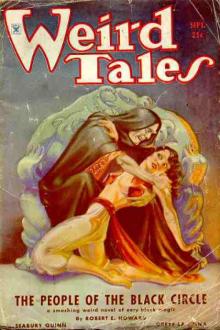 The People of the Black Circle (conan the barbarian)
The People of the Black Circle (conan the barbarian) Almuric
Almuric Xuthal of the Dusk (conan the barbarian)
Xuthal of the Dusk (conan the barbarian)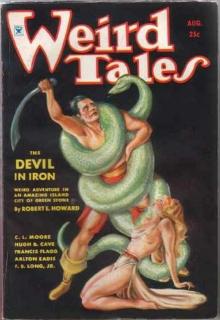 The Devil in Iron (conan the barbarian)
The Devil in Iron (conan the barbarian) Beyond the Black River (conan the warrior)
Beyond the Black River (conan the warrior) The Phoenix on the Sword (conan the barbarian)
The Phoenix on the Sword (conan the barbarian)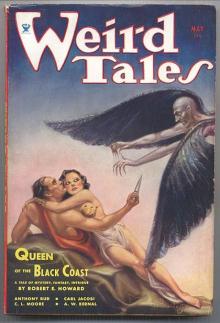 Queen of the Black Coast
Queen of the Black Coast The Tower of the Elephant (conan the barbarian)
The Tower of the Elephant (conan the barbarian) Black Colossus
Black Colossus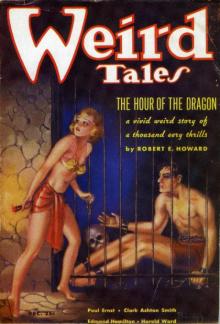 The Hour of the Dragon (conan the barbarian)
The Hour of the Dragon (conan the barbarian)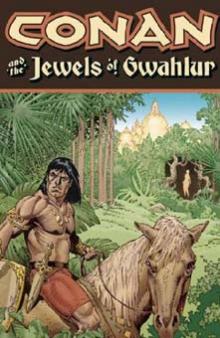 Jewels of Gwahlur (conan the warrior)
Jewels of Gwahlur (conan the warrior) Gods of the North (conan the barbarian)
Gods of the North (conan the barbarian) The Pool of the Black One (conan the barbarian)
The Pool of the Black One (conan the barbarian) A Witch Shall Be Born
A Witch Shall Be Born Red Nails (conan the warrior)
Red Nails (conan the warrior)